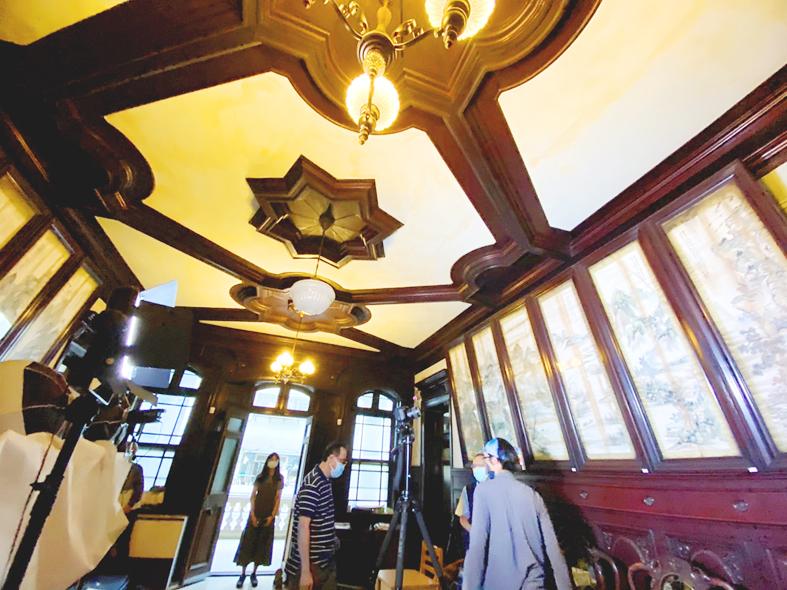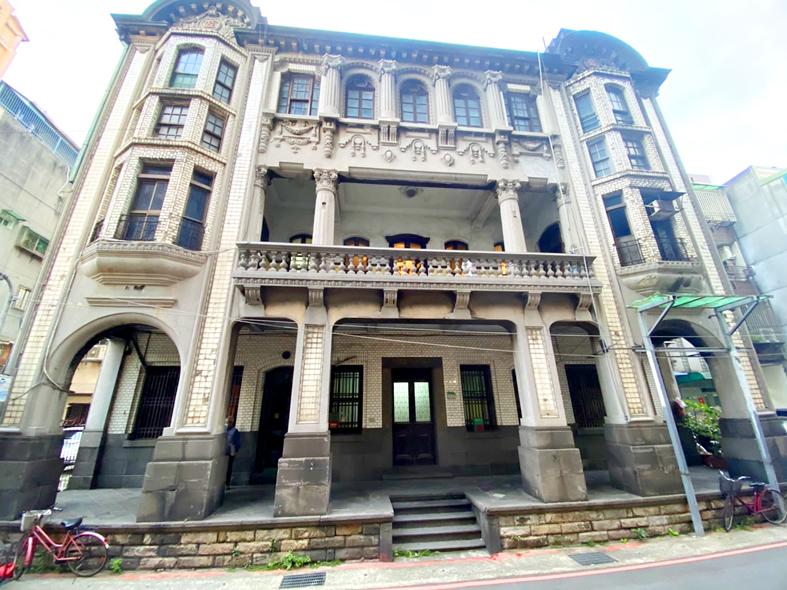The Taipei Department of Cultural Affairs has commissioned an effort to document artifacts in the historic Chen Tien-lai Residence (陳天來故居) as part of a heritage restoration project.
Built in 1924 by Chen, a wealthy tea merchant in what is today known as Datong District (大同), the mansion is an example of Taiwan’s cosmopolitan architecture style of the Japanese colonial period, the department said in a statement on Tuesday.
Years of property disputes among Chen’s descendants hindered efforts to preserve the house as a cultural site until the city assumed its management through Article 28 of the Cultural Heritage Preservation Act (文化資產保存法), it said.

Photo: Yang Hsin-hui, Taipei Times
Putian Enterprise has been contracted to document the architectural features of the house and more than 300 items before the department can proceed with the project next year, it said.
The contractor’s team was cited as saying that the systematic survey would use special instruments to perform a compositional analysis and dating of the artifacts.
Such information is required for a restoration plan that would preserve the historical characteristics of the structure and the artifacts it houses, it said.

Photo: Yang Hsin-hui, Taipei Times
The flooring made of Southeast Asian bricks, the furniture made of Taiwanese red cypress and Indian narra wood found throughout the house, and its Fujianese carpentry are evidence that the Chen family presided over a far-flung trade network, it said.
Careful historic preservation is often neglected in Taiwan, and the specialists are attempting to take extra measures to protect the historical objects within the house during the project, it said.
Descendant Chen Chun-hung (陳淳渱) was cited as saying that giving the mansion to the city was the correct decision for preserving the family’s legacy and place in history.
The city is aiming to complete the NT$100 million (US$3.6 million) restoration project on the 100th anniversary of the mansion’s construction in 2024, the department said.
The building is to become a permanent venue for the display of historical artifacts, while the garden is to become a public recreational area, it said.

Eight restaurants in Taiwan yesterday secured a one-star rating from the Michelin Guide Taiwan for the first time, while three one-star restaurants from last year’s edition were promoted to two stars. Forty-three restaurants were awarded one star this year, including 34 in Taipei, five in Taichung and four in Kaohsiung. Hosu (好嶼), Chuan Ya (川雅), Sushi Kajin (鮨嘉仁), aMaze (心宴), La Vie by Thomas Buhner, Yuan Yi (元一) and Frassi in Taipei and Front House (方蒔) in Kaohsiung received a one-star rating for the first time. Hosu is known for innovative Taiwanese dishes, while Chuan Ya serves Sichuan cuisine and aMaze specializes

Taitung County is to launch charter flights to Malaysia at the end of this year, after setting up flights to Vietnam and Thailand, the Taitung County Government said yesterday. The new charter flight services, provided by low-cost carrier Batik Air Malaysia, would be part of five-day tour packages for visits to Taitung County or Malaysia. The Batik Air charter flight, with about 200 seats, would take Malaysian tourists to Taitung on Dec. 30 and then at 12:35pm return to Kuala Lumpur with Taiwanese tourists. Another charter flight would bring the Taiwanese home on Jan. 3 next year, arriving at 5:30pm, before taking the

Taiwan High Speed Rail Corp. (THSRC) plans to ease strained capacity during peak hours by introducing new fare rules restricting passengers traveling without reserved seats in 2026, company Chairman Shih Che (史哲) said Wednesday. THSRC needs to tackle its capacity issue because there have been several occasions where passengers holding tickets with reserved seats did not make it onto their train in stations packed with individuals traveling without a reserved seat, Shih told reporters in a joint interview in Taipei. Non-reserved seats allow travelers maximum flexibility, but it has led to issues relating to quality of service and safety concerns, especially during

An exhibition celebrating Taiwan and Japan’s comic culture opened on Saturday in Taichung, featuring a section that explores Taiwanese reproductions of Japanese comics from when martial law limited Japanese representation. “A Century of Manga Culture: An Encounter of Taiwan and Japan’s Youth” held its Taiwan opening ceremony at Taichung’s National Taiwan Museum of Comics after an initial one-month run in Japan’s Kyoto International Manga Museum between May 24 and June 24. Much like the Kyoto exhibition, the show mainly celebrates the comic connection between Taiwan and Japan through late Taiwanese comic book